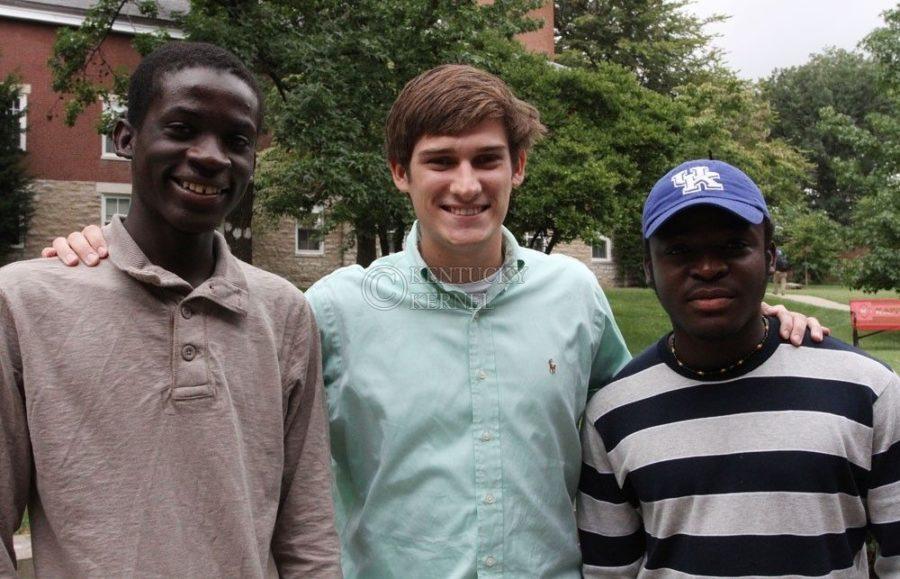Aspiring doctors hope to change lives, better communities
September 13, 2011
By Brooke McCloud
In 2010, an earthquake in Haiti left the country hailing for hope and health care.
International aid flew to the scene, including a team of doctors from Lexington.
Over the course of a month, Dr. Pat Duff, an anesthetist, and his team formed a close bond with Haitian high schools students.
Pedro Jean-Baptiste and James Blanc translated various languages into English for the Kentucky doctors.
Duff and the team of doctors specially designed The Kentucky Haiti Partnership, a 501(c)3 non-profit organization, to finance the two students’ undergraduate and medical school educations.
This fall, the students began their first semester at UK.
“After the earthquake, we had no hope to go to college, but the doctors gave us hope,” Jean-Baptiste said.
Both students are studying biology.
Blanc and Jean-Baptise plan to return to Haiti after their 10-year-long education, hoping for a better future for themselves and for their country.
“Being a doctor could be good for my family, my community and Haiti,” Blanc said.
Student Government President Micah Fielden is both a friend and mentor to the Haitian students.
“They are the future of Haiti,” Fielden said.
Fielden had worked with his family in Haiti after the earthquake and is a close friend with Duff. The two worked together, along with the rest of the doctors, to bring the students to UK.
“After the earthquake I saw the need to have a good surgeon in the community,” Blanc said. “It has become my passion and I am fighting for it.”
Duff and his Kentucky team offered services to a city with only a couple of doctors and zero surgeons.
Ouanaminthe City, located in the northeast corner of Haiti, is home to 100,000 residents and has no running water.
The 7.0 magnitude earthquake killed an estimated 46,000 people, injured 220,000 and left 1.5 million homeless.
The city was desperate for aid after the earthquake, but translators were needed first.
High school students Blanc and Jean-Baptiste were assigned as translators at the Ouanaminthe City medical center.
Prior to the earthquake, that medical center was their high school.
For a month, Institution Univers, one of the best schools in Haiti, was transformed into a medical clinic.
“They had traveled to the U.S twice before, both times due to their academic success,” Fielden said of Blanc and Jean-Baptiste.
The tuition for their high school is $110 a year, while the average annual household income for the area is $400.
“I am the youngest of seven,” Jean-Baptiste said. “My family did not have the opportunity to give me any more education. It wasn’t possible.”
During that month, Duff formed a strong bond with the two students and refused to let the two go without a college education.
“We became close friends with the doctors, and after talking to them they told us that one way they could help us and help Haiti was to come to college in America,” Jean-Baptiste said.
Duff worked with Georgetown College and both of the students were admitted for the Spring 2010 semester nine months after the process had begun.
“My family knew this opportunity was a good thing and when I come back it isn’t only beneficial for them, but beneficial for my community too,” Blanc said.
Jean-Baptiste and Blanc arrived in January to unfamiliar weather. Neither one of them had seen snow before.
“I didn’t like the cold,” Jean- Baptiste said. “I am used to the warm weather in Haiti.”
As the winter weather began to thaw, Duff and Fielden continued working with UK.
In the fall of 2011, the students transferred to UK to continue their degrees in biology.
The Kentucky Haiti Project estimates that each student will need $300,000 plus living and travel costs to complete their Kentucky undergraduate and medical school educations.
Blanc and Jean-Baptiste want to become doctors for many reasons.
“When I was young, my mother passed away,” Blanc said. “I also want to be a doctor because it is good for my community.”
Blanc and Jean-Baptiste are living in Smith Hall and working in UK’s Office of Admissions and Recruitment while taking 15-hour course loads.
Fielden said their presence is welcomed.
“We can help them by providing education, but in return they give us so much more,” Fielden said.


























































































































































